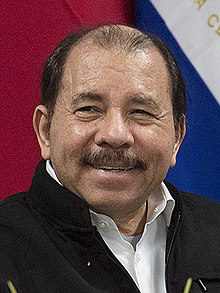

President of Nicaragua
11 November 1945 La Libertad, Nicaragua
-
Incumbent
Nicaraguan politician In this Spanish name, the first or paternal surname is Ortega and the second or maternal family name is Saavedra. Daniel OrtegaOrtega in January 201729th and 33rd President of NicaraguaIncumbentAssumed office 10 January 2007Vice President Jaime Morales Carazo (2007–12) Moisés Omar Halleslevens (2012–17) Rosario Murillo (2017–present)Preceded by Enrique BolañosIn office 18 July 1979 – 25 April 1990Vice President Sergio Ramírez Mercado (1985–90)Preceded by Anastasio Somoza DebayleSucceeded by Violeta ChamorroCoordinator of the Junta of National Reconstruction of NicaraguaIn office 18 July 1979 – 10 January 1985Preceded by Francisco Urcuyo (Acting President) Succeeded by Himself (President) Personal detailsBornJosé Daniel Ortega Saavedra (1945-11-11 ) 11 November 1945 (age 75) La Libertad, NicaraguaPolitical partyFSLNSpouse(s)Rosario Murillo (m. 2005)Children15MotherLidia SaavedraFatherDaniel Ortega CerdaSignature Politics of Nicaragua Constitution Abortion law LGBT rights Executive President Daniel Ortega Vice President Rosario Murillo Legislature National Assembly President: Gustavo Porras Cortés Administrative divisions Departments Municipalities Elections Recent elections General: 201120162021 Political parties Foreign relations Ministry of Foreign Affairs Minister: Denis Moncada Colindres Diplomatic missions of / in Nicaragua Passport Visa requirements Visa policy Nicaragua portal Other countries vte Part of a series onPopulism Variants Black Chauvinism Left-wing Narodniks Penal Poporanism Right-wing Techno- Völkisch Concepts Anti-establishment Anti-intellectualism Common people Demagogy Egalitarianism Elitism General will Ochlocracy Popular democracy Pluralism Social justice Third Position Regional variants Canada Europe Latin America New Zealand United States Related topics Agrarianism Alt-right Authoritarianism Berlusconism Chavismo Communism Fascism Gaullism Janism Kirchnerism (Relato K) Nationalism New Left New Right Peronism Pink tide Putinism Radical centrism Socialism Trumpism Politics portalvte José Daniel Ortega Saavedra (Spanish pronunciation: ; born 11 November 1945) is a Nicaraguan politician serving as President of Nicaragua since 2007; previously he was leader of Nicaragua from 1979 to 1990, first as Coordinator of the Junta of National Reconstruction (1979–1985) and then as President (1985–1990). A leader in the Sandinista National Liberation Front (Spanish: Frente Sandinista de Liberación Nacional; FSLN), he implemented policies to achieve leftist reforms across Nicaragua. In later years, Ortega's previously far left politics moderated more and more, pursuing pro-business policies and even rapprochement with the Catholic Church, with the adoption of strong anti-abortion policies by his government in the 2000s, and adoption of strong religious rhetoric by the previously atheist Ortega. After the retirement of Fidel Castro in 2008, Ortega is currently one of the longest non-royal rulers in the world and the longest serving non-royal leader in the Americas. Born into a working-class family, from an early age Ortega opposed Nicaragua's dictator, Anastasio Somoza Debayle, and became involved in the underground movement against his government. Joining the Sandinistas as a student in 1963, Ortega became involved with urban resistance activities and was arrested and imprisoned in 1967. Ortega, like many political prisoners of the Somoza regime, was tortured and abused in jail. Upon release in 1974, he was exiled to Cuba, where he received training in guerrilla warfare from Fidel Castro's Marxist–Leninist government. Ortega played a crucial role in forming the Insurrectionist faction, which united the FSLN and sparked the mass uprisings of 1978–1979, culminating in the Nicaraguan Revolution. After the overthrow and exile of Somoza's government, Ortega became leader of the ruling multi-partisan Junta of National Reconstruction. In 1984, Ortega won Nicaragua's disputed presidential election with over 60% of the vote as the FSLN's candidate. A Marxist–Leninist, Ortega pursued a program of nationalization, land reform, wealth redistribution and literacy programs during his first period in office. Ortega's relationship with the United States was never very cordial, as the US had long supported the Somoza Family's dictatorship. Although the US initially supplied the ruined post-revolution Nicaragua with economic aid, relations quickly soured. His government was beset by violent opposition from US-backed rebels (known as the Contras). This illegal intervention continued (albeit covertly) after Ortega's democratic election as president in 1984. Peace talks between five Central American heads of state in July 1987 led to the signing of the Central American Peace Accords, and the beginning of a roadmap to the end of the conflict. In 1988, the Contras first entered into peace talks with the Sandinista government, although the violence continued, as did their US support. Despite US opposition, disarmament of the Contras began in 1989. The US continued the economic embargo, promising to lift it if the Sandinistas were ousted in the election, providing financial support to the opposition candidate, and promising aid to Nicaragua should she be elected. After a difficult presidency marred by war and economic collapse, Ortega was defeated in the 1990 general election by Violeta Chamorro. He continued to be an important figure in Nicaraguan opposition politics. Ortega was an unsuccessful candidate for president in 1996 and 2001, but he won the 2006 presidential election. In office, he made alliances with fellow Latin American socialists, such as Venezuelan President Hugo Chávez. Under Ortega's leadership, Nicaragua joined the Bolivarian Alliance for the Americas. His second administration has become increasingly antidemocratic, alienating many of his former revolutionary allies, some of whom compared him to Somoza, whom they had overthrown. In June 2018, Amnesty International and the Inter-American Commission on Human Rights of the Organization of American States reported that Ortega had engaged in a violent oppression campaign against protesters in response to anti-Ortega protests since April 2018.

We use cookies
We use cookies and other tracking technologies to improve your browsing experience on our website, to show you personalized content and targeted ads, to analyze our website traffic, and to understand where our visitors are coming from. Privacy Policy.